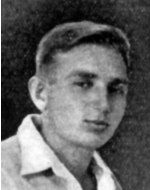Tsfati, Yehuda (Yehuda’le)
Son of Pia and Emanuel was born on July 10, 1925, in Tel Aviv. From childhood, he was a mischievous boy and excelled in studies that required logic and thought. Yehuda joined the Haganah and then he joined the Palmach and went with his comrades to a training nucleus at Sha’ar Ha’amakim and Tel Amal, where he completed a course for commanders. Yehuda participated in the Palmach’s underground activities, in bringing up illegal immigrants, releasing detainees in Atlit and other activities, and was one of the first founders of Kibbutz Nirim. After a while he participated in the explosion of the police station in Giv’at Olga, and devoted himself to rescuing brothers who were striving to immigrate to Eretz Israel. In August 1947 he went abroad to work in the underground in “Aliyah Bet.” With the outbreak of the War of Independence Yehuda demanded from the commander a Return to the land, but received no reply. He traveled as the commander of the illegal immigrant ship “Besieged Jerusalem” with 700 illegal immigrants. The ship was caught by the British and sent to Cyprus. There he trained the youth in preparation for their mobilization to defend the country. When he returned to Palestine he joined his unit in Palestine as a platoon commander and was sent to defend besieged Jerusalem. He joined the “Palmach” battalion of the Palmach Harel Brigade and participated in battles for the Castel, Beit Mahsir, Beit Sussin, Saris, Tzora, Shaar Hagai, and Jerusalem. In his book “Chapters in the War of Israel,” he describes his participation as a “quiet and arresting” commander: “When we were attacked by armored vehicles, To the point of hiding Molotov cocktails at the armored vehicles, set them on fire, and returned his entire division safely without wounded … “After the breach of the wall of the Old City, Yehuda got into a road accident, and he suffered from a concussion, but before he could recover, he demanded to be returned to his unit claiming that “two legs are healthy for me.” He felt with his platoon to help a unit at the outpost of Beit-Tul. Five days later, Yehudah was able to order a retreat, but he himself fell on the 11th of Tammuz 5708 (18.7.1948), and after his fall was raised to the rank of lieutenant. On the 28th of Adar 5702 he was brought to rest at the military cemetery on Mount Herzl in Jerusalem.
